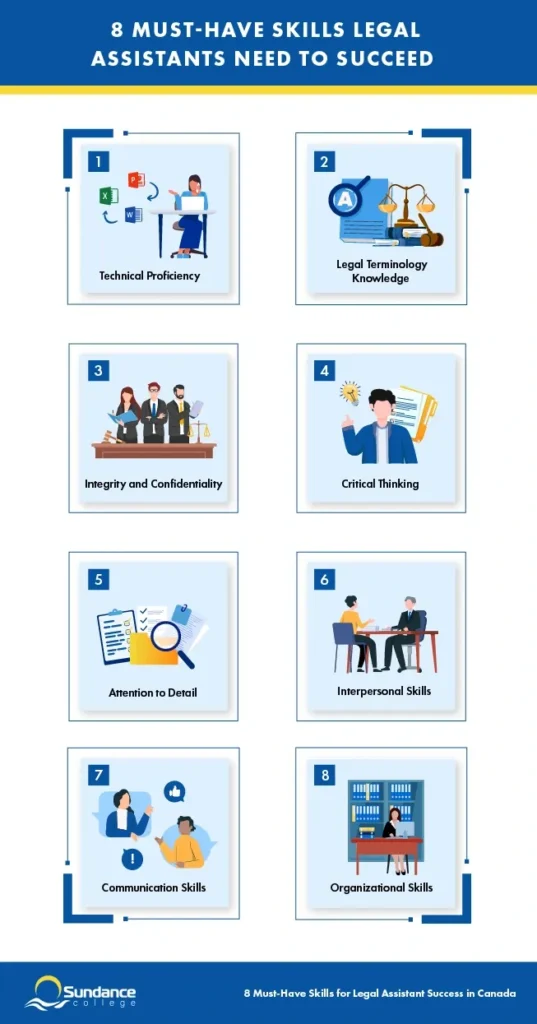Blog / 8 Must-Have Skills for Legal Assistant Success in Canada
8 Must-Have Skills for Legal Assistant Success in Canada

Professional Legal Assistant Diploma
- Legal Assistant
- Legal Secretary
- Legal Administrative Assistant
- Technical proficiency in legal software and tools
- Knowledge of legal terminology
- Integrity and confidentiality
- Critical thinking
- Attention to detail
- Communication, interpersonal, and organizational skills
Table of Contents
Legal assistants play a crucial role in keeping law offices organized, efficient, and responsive—especially as demand grows across Canada. From managing court filings to preparing client documents, their skills directly impact legal teams and impact case outcomes. Now, legal industry trends point to key skills for legal assistants that help accelerate legal processes, like being able to work with digital tools.
To succeed, learn the must-have skills legal assistants need in every legal setting.

Listen to: 8 Must-Have Skills for Legal Assistant Success in Canada
1. Technical Proficiency: Mastering Legal Software & Tools for Efficiency
Legal assistants take care of a variety of tasks, such as creating presentations, organizing and running video calls, and backing up files. To maintain legal efficiency in today’s law offices, proficiency with legal software and legal tech tools is the norm.
As Amanda M., the Professional Legal Assistant diploma program instructor, explains:
“Our goal is to make students job-ready across legal practice areas. That’s why we train them on tools like PCLaw, which are used by everyone from small boutique firms to large ones.”
Tools like PCLaw for legal accounting and trust management, as well as support software that helps lawyers organize and analyze documents and transcripts efficiently, are widely used across many legal fields. A strong foundation in Microsoft Outlook, Word, and Excel is also crucial for communication, document creation, and task tracking. Legal assistants with these technical skills are in high demand by employers.
2. Legal Terminology Knowledge: Mastering Legal Language & Concepts
Legal assistants must have a broad and comprehensive understanding of legal terms and legal concepts across various areas of law, such as civil litigation, corporate law, family law, and real estate law. Since the job involves regular reading and writing for tasks like drafting trial briefs and reviewing living wills, legal assistants must be able to communicate accurately within a legal context.
Understanding legal jargon is especially valuable in client relationships. While clear, plain language is best for direct communication, a firm grasp of legal terms allows legal assistants to interpret complex documents and explain them to clients in understandable ways. This helps clients feel informed, reassured, and more trusting of the legal process.
Amanda M., the Professional Legal Assistant diploma program instructor, highlights how students build this knowledge:
“Legal terminology can be intimidating at first. That’s why we teach it through context—students apply new terms in mock case files, client letters, and legal documents every week.”
At the same time, being well-versed in legal terminology enables legal assistants to assist lawyers more effectively. With this knowledge, legal assistants can draft and proofread legal documents, conduct thorough research, and organize case files with precision. This allows lawyers to focus on strategy and advocacy and makes you a valued member of the legal team.
3. Integrity & Confidentiality: Upholding Legal Ethics & Client Privacy
On a regular basis, legal assistants deal with private documents and sensitive information, from personal details about clients to undisclosed facts about an upcoming trial.
Upholding legal ethics and confidentiality is vital, as these professionals must always act with respect, professional integrity, and a strong commitment to client privacy. Handling confidential documents appropriately requires the highest standards of discretion.
As Amanda M., the Professional Legal Assistant diploma program instructor, explains,
“A breach of confidentiality isn’t always dramatic—it can be as simple as a careless email or loose conversation. We teach students to be vigilant in everything they do.”
This approach is critical to both the personal success of the legal assistant and the overall success of the legal team they support.
4. Critical Thinking: Analytical Skills for Problem-Solving & Research
Since legal assistants are often asked to conduct legal research, strong analytical skills are necessary in compiling information that’s needed for a case. To uphold legal standards, legal assistants need critical thinking for legal support to search effectively, assess trustworthy sources, and separate useful facts from irrelevant details.
Amanda M., highlights how these skills are developed in training:
“We challenge our students with actual case studies. They need to analyze facts, ask the right questions, and think several steps ahead—just like they would on the job.”
This helps to develop problem-solving skills to handle unexpected issues or address gaps in information. Legal assistants are often called on to assist with trial preparation and court proceedings, when misinformation could affect the outcome of a case.
This is why it’s so valuable when you as a legal assistant source trusted information and apply logical, evidence-based reasoning.
5. Attention to Detail: Ensuring Accuracy in Legal Documentation & Filings
Across all areas of law, accuracy in a legal assistant’s work is necessary, making attention to detail essential for success. Legal assistants are responsible for reviewing legal documentation and preparing legal filings. From names and dates to legal terms, they make sure every detail is correct. Even minor errors, such as typos, incorrect dates, or double-booked meetings, can have serious repercussions for important case files.
Amanda M., the Professional Legal Assistant diploma program instructor, emphasizes the importance of attention to detail in relation to accuracy:
“Legal documents are unforgiving. One missing word can change its meaning entirely. That’s why we build attention to detail into every assignment, from writing contracts to reviewing court documents.”
To maintain the highest standards, legal assistants often use proofreading tools and legal software to identify formatting inconsistencies, spelling errors, and missing information. Many adopt version control strategies such as maintaining clear document naming conventions, using timestamps, and tracking revisions to make sure that only the most current and accurate legal documents are used.
By combining meticulous attention to detail with effective proofreading and version control, legal assistants maintain the integrity of every legal filing.
6. Communication Skills: Effective Client & Team Collaboration
Lawyers turn to their legal assistants to draft both internal and external correspondence, in addition to proofreading legal documents.
For this reason, written communication skills are a must-have skill for a legal assistant. High proficiency in spelling, grammar, vocabulary, and transcription is all necessary for the role. Another important aspect of legal assistant communication is having strong teamwork skills.
As Amanda M., the Professional Legal Assistant diploma program instructor, points out,
“Strong communicators make great legal assistants. Whether they’re giving updates to a lawyer or helping a client understand a next step, clarity and poise are everything.”
When collaborating with colleagues, lawyers, and people outside the firm, a strong foundation of communication skills makes it possible to handle the responsibilities that come with the job. Since a legal assistant frequently serves as the point of contact with other law firms and clients, they’re expected to deliver excellent client communication with professionalism.
By having strong communication skills, you become an essential collaborator to legal teams and confidante to clients during the legal process.
7. Interpersonal Skills: Building Strong Client Relationships & Professional Networks
Legal assistants require strong interpersonal skills due to the large amount of time they spend corresponding by phone, email, and in person with lawyers, clients, opposing counsel, and more.
These encounters may take place face to face, over the phone, on video conferences, or through email.
As Amanda M., the Professional Legal Assistant diploma program instructor, points out, “Legal assistants are often the first point of contact. We teach students to show empathy while staying professional, especially when clients are stressed or dealing with legal challenges.”
A top-notch legal assistant should be able to greet people graciously, provide clear instruction, and diffuse tense situations, all while demonstrating empathy and understanding. This involves listening attentively, expressing ideas clearly, utilizing proper phone etiquette, and negotiating effectively.
When it comes to teamwork, these skills are essential. Legal assistants often collaborate with colleagues to manage cases, share tools, and support the legal team. Another priority these skills apply to is building strong client relationships, which require a professional and approachable demeanor.
Additionally, interpersonal skills help with career progression through professional networking. By attending networking events, legal assistants put those skills into action through connecting with peers, learning from industry experts, and finding new opportunities for growth in the legal field.
8. Organizational Skills: Efficiently Managing Legal Documents & Caseloads
Lawyers rely on legal assistants to perform a wide range of responsibilities, making the organizational skills of a legal assistant essential. These legal professionals must expertly manage a lawyer’s calendar, deadlines, paperwork, and correspondence with external parties, while making sure lawyers are prepared for client meetings, court proceedings, and more.
The stakes for staying organized in legal work are high, as Amanda M., the Professional Legal Assistant diploma program instructor, points out:
“In legal work, being organized isn’t just efficient—it’s protective. One missed filing date or document error can derail a case. That’s why we train students to stay structured under pressure.”
In addition to having an organized disposition, using modern legal software tools helps legal assistants with case management like tracking deadlines and organizing files. Legal documentation management relies a lot on legal software to assist with drafting by catching any errors and presenting a clean format.
Equipped with digital tools and an organized mindset, you as a legal assistant will play a pivotal role in keeping law offices running efficiently and minimizing mistakes.
Why Choose Sundance College’s Legal Assistant Program: Skills-Based Training

Sundance College’s Professional Legal Assistant diploma program offers theoretical and applied academic experience, preparing you to become a professional in the field of law.
Whether you have a special interest in family law, real estate law, criminal law, or corporate law, our industry-trained instructors equip each student with the legal knowledge and technical skills required to succeed.
Christina B., an honours graduate of our Professional Legal Assistant diploma program, reflects on how her education prepared her for work within the Government of Alberta as a legal assistant to the Crown Prosecutor:
“The support of the instructors built me up to feel like I was able to have such a high-profile career and got me where I am.
The program gave me the best opportunity to fully learn how to do legal research and write about it—going in-depth into research and case law.”
Christina’s experiences illustrate how career-focused legal assistant training and the support from industry-aligned instructors lay the groundwork for success.
The Sundance College legal assistant course allows you to focus on one subject at a time. This structure helps you learn legal skills effectively while balancing school with a busy schedule. With the time and space to fully absorb the material, you’ll be prepared to apply what you’ve learned during your practicum.
Whether it’s at a lawyer’s office, legal department, or another legal setting, it’s the same approach that helped Christina succeed, and it can work for you too.
Additionally, our graduates receive a full range of Career Services to support them throughout their professional journey.
Building strong skills like technical proficiency, legal terminology knowledge, integrity and confidentiality, critical thinking, and attention to detail is key to succeeding in a legal assistant career. At Sundance College, students receive trusted legal training designed by experienced professionals who understand the demands of today’s legal field. Through hands-on instruction, industry-relevant software, and a practicum placement, students build practical legal skills that apply directly to the workplace. With access to legal assistant career advice, mentorship, and ongoing professional development opportunities, graduates are prepared to work in various roles across law firms, government offices, and corporate legal departments—just like the many alumni who have started their careers through our program.
Legal assistants keep the legal process running smoothly every day. Enroll in Sundance College’s Professional Legal Assistant diploma program for the skills necessary to advance towards a legal assistant career path.
Legal Assistant FAQs
Do you need to know more about the skills you need to succeed as a legal assistant? Here are a few answers to frequently asked legal assistant career questions.
-
What are the top skills for a legal assistant?
The top skills a legal assistant must have:
- Technical proficiency in legal software and tools
- Knowledge of legal terminology
- Integrity and confidentiality
- Critical thinking
- Attention to detail
- Communication, interpersonal, and organizational skills
These skills help legal assistants perform their duties effectively and contribute to the success of any legal team.
-
Why are organizational skills important for legal assistants?
Legal assistants often manage dozens of active files, each with its own deadlines, documents, and correspondence. Strong organizational skills help make sure nothing falls through the cracks. They allow legal assistants to handle tasks like:
- Tracking court dates
- Client meetings
- Filing deadlines
- Keeping documents properly labelled with the current version
Disorganization in a legal setting can lead to missed deadlines, lost documents, or costly errors, making this one of the most essential skills in the role.
-
What technology do legal assistants use?
Legal assistants use tools like PCLaw for legal accounting and trust management, along with support software that helps lawyers organize and analyze documents and transcripts efficiently. Strong skills in Microsoft Outlook, Word, and Excel are also essential for communication, document creation, and task tracking.
-
How can I improve my legal assistant skills?
Enrolling in a Professional Legal Assistant diploma program is the best way to build job-ready skills. You’ll want hands-on training in legal software like PCLaw, so you’re staying current with the tools used in modern law firms. With a practicum placement included in your education, it gives you the chance to apply your skills in a real legal setting and get the experience to stand out and get hired. On top of learning from instructors who’ve worked in the legal field, you’ll be taught by seasoned professionals who understand what law offices actually need—and how to help you succeed in them.
-
Is communication a key skill for legal assistants?
Yes—communication is essential. Legal assistants write emails, letters, and legal documents that must be clear and professional. They also speak with lawyers, clients, and court staff, so strong verbal communication and active listening are critical. How a legal assistant communicates directly affects trust, efficiency, and the overall success of a legal office.
-
What role do interpersonal skills play in a legal assistant’s success?
Interpersonal skills play a key role in a legal assistant’s success, as much of their work involves frequent communication with lawyers, clients, opposing counsel, and court staff. Whether by phone, email, video call, or in person, legal assistants must be able to interact with them all with professionalism.
These skills help legal assistants greet people professionally, give clear instructions, listen carefully, and handle tense or sensitive situations with empathy and tact.
Strong interpersonal skills are essential to teamwork as well, especially in being able to collaborate with colleagues effectively. Just as important, they help legal assistants build trust and positive relationships with clients and grow their professional network—both of which can open doors to career advancement.
By having strong interpersonal skills, legal assistants are able to navigate a wide range of professional interactions with clarity and professionalism.
Subscribe for more career advice
Blog Categories
Share on:
